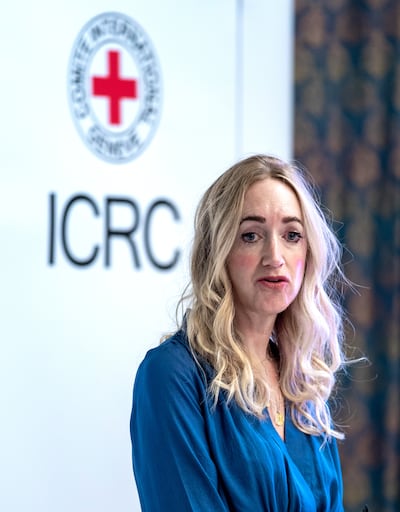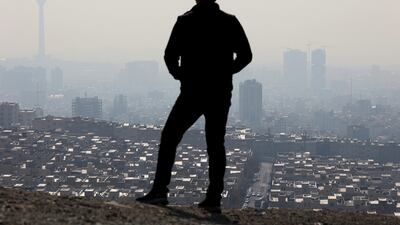Global collaboration to support vulnerable nations heavily affected by an additional 250,000 deaths caused by climate change is essential to prevent the collapse of health systems, experts said ahead of the first dedicated health day at a Cop summit.
A package of solutions lined up to address the climate resource gap for highly vulnerable, fragile, and conflict-affected communities will be discussed as part of the Relief, Recovery, and Peace Day on December 3.
Finance and emerging technology are opportunities to scale up health services in countries in the firing line of climate change, and those most affected by displacement of communities, conflict and instability.
Dr Shyam Bishen, head of the Centre for Health and Healthcare at the World Economic Forum, said financing to protect vulnerable health systems should be central to talks.
World Economic Forum
“Presidencies before this have been focused on decarbonisation and net zero, which is obviously critically important,” Dr Bishen said.
“Now we are seeing the big impact of climate change on human health, and finally the health agenda is there [at Cop].
“Whether it's infectious diseases, an increase in vector-borne diseases like Zika and Dengue and others, or the impact of respiratory diseases like asthma, COPD [chronic obstructive pulmonary disease] and lung cancer.
“We know up to seven million people are now dying of air pollution because of climate change.”
Data from the World Health Organisation (WHO) exposed the intricate connection between climate change and global health. A staggering 3.6 billion people currently inhabit regions highly vulnerable to the consequences of climate change.
In January at the WEF annual meeting in Davos, the Centre for Health and Health Care launched a climate and health initiative working closely with the WEF Centre for Nature and Climate and philanthropic organisations, such as the Rockefeller Foundation, to find solutions to improve air quality.
“Premature death because of air pollution is the highest killer in the world right now,” Dr Bishen said.
“With air pollution, it's not just the impact on food production, but also water pollution and extreme weather events.
“This is having a big impact on human health, finally the world is realising it's time to focus on this issue.”
Millions more deaths
A long list of health complaints associated with climate change are driving an expected rise in mortality, with 250,000 more deaths forecast every year from 2030 to 2050 as a result of a changing environment.
But what makes us better is also slowly beginning to do us harm.
The healthcare industry itself is understood to be responsible for almost 6 per cent of all carbon emissions, and continues to pollute the world in which we live.
Pollution and suffocating smog that has claimed the lives of millions has forced the complex issue of climate-change-driven health issues to top the agenda.
“Climate change poses a significant public health crisis, with its immediate and prolonged consequences proving challenging to quantify,” said Dr Shamsheer Vayalil, chairman of Burjeel Holdings, one of the region’s largest healthcare groups.
“Healthcare professionals are observing manifestations of climate change on human health, including an increase in low-birth-weight babies, miscarriages, and medical cases involving children with impaired lung function due to air pollution.
“Additionally, there is a rise in patients experiencing inflammatory skin diseases linked to allergies, heat, and air pollution, exacerbation of symptoms in individuals with pre-existing heart conditions, and reports of elevated cancer deaths associated with climate change.”

Millions of extra deaths are expected in the decades ahead, resulting from climate-induced undernutrition, malaria, diarrhoea, and heat stress. These effects extend beyond the health sector, affecting critical areas such as agriculture, water, and sanitation.
Soaring health costs
Health-related costs resulting from climate change are expected to increase to as much as $4 billion a year by 2030, according to WHO projections.
“Strengthening healthcare infrastructure emerges as a pivotal aspect of health financing,” Dr Vayalil said.
“This involves enhancing healthcare worker capabilities, ensuring a consistent supply of medical resources and reinforcing the resilience of healthcare facilities.
“As we observe the escalating effects of climate change on health, the necessity for global collaboration has never been more evident.”
According to the National Oceanic and Atmospheric Administration, the hottest years on record have all occurred since 2010.
This year, around the world, June and July experienced extremely high temperatures, possibly making July the hottest month recorded since 1850.
Across Africa, reduced access to water, sanitation and hygiene caused by climate change has placed 10 countries at high risk, with six of those also embroiled in conflict.
Clare Dalton, head of delegation for the International Committee of the Red Cross, said conflict adds an extra layer of vulnerability to those affected by a changing environment.
"If essential infrastructure, water sanitation or electricity has been damaged by conflict, that is going to impact on people's access to services,” she said.
“Mozambique is a good example, as there is a history of low investment.

“There is marginalisation, and repeated tropical storms with people fleeing conflict.
“Electricity and water systems are often disrupted, and storms are increasing in severity and frequency.
“Early warning systems are not functioning as they should, which compounds the impact.”
Under pressure
Health professionals around the world are already dealing with the personal and clinical consequences of climate change.
Despite these challenges, optimism exists. Reducing greenhouse gas emissions and investing in robust healthcare systems, especially in family medicine and primary health care, can alleviate up to 90 per cent of the expected disease burden.
“The health impacts of climate change are both direct and indirect, triggering a detrimental cycle, jeopardising well-being and economic stability,” said Dr Mohammad Fityan, head of the weight management clinic at Burjeel Medical City, Abu Dhabi.
“Focusing on prevention and promoting healthier lifestyles can simultaneously reduce our greenhouse gas footprint.
“This transformative effort addresses not only climate change but also the diseases we face today.
“Recognising this, policymakers must prioritise climate action.”


